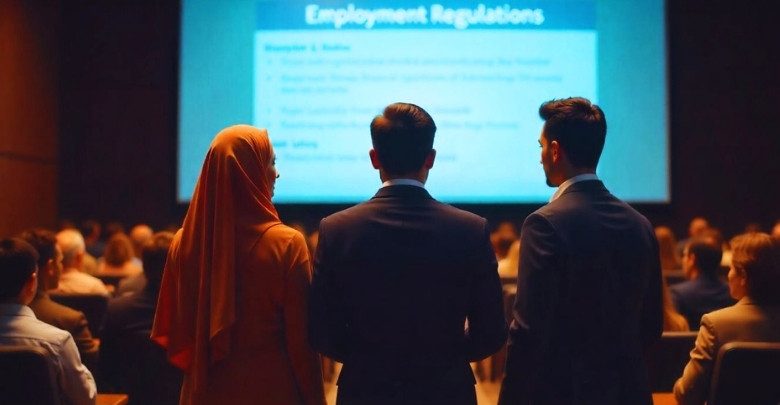A conference visa in Australia is designed specifically for individuals attending professional events, seminars, or conferences. It provides attendees with the opportunity to network, learn, and engage with peers from across the globe.
If you’re wondering, “Can I Work With a Conference Visa in Australia?” The response is straightforward. Unfortunately, this visa does not permit any form of employment. It strictly allows you to participate in the event for which it was granted.
For those looking to work in Australia while attending or after a conference, other visa options must be considered. Stay with us as we explore these alternatives and the steps required to legally work in Australia in the rest of this article.
Who Qualifies for a Conference Visa in Australia?
A conference visa in Australia is available to international visitors who plan to attend events like seminars, workshops, or professional gatherings. It’s designed for those looking to learn, network, and gain insights within their industry. Applicants need a valid passport and official invitation or confirmation for their event participation.
People attending upcoming international conferences in Australia often apply for this visa to enter the country legally and smoothly. It’s ideal for professionals who wish to exchange ideas without staying long-term. However, this visa strictly permits attending events and does not allow any work or paid activities.
To qualify, applicants should have proof of financial means to cover their stay and return travel. A good health status and adherence to Australia’s visa requirements are essential. This visa is for short-term stays and is valid only during the conference period.
Limitations and Restrictions on a Conference Visa
In Australia, a conference visa provides access to short-term events, but there are specific limitations and restrictions. These rules help ensure that visitors follow visa conditions while attending conferences. Below are key restrictions applicants should be aware of:
- Restricted to Event Participation Only: Holders can only participate in the specific conference or event noted in their visa. Any other professional activities are prohibited.
- Limited Stay Duration: This visa grants only a short-term stay, typically for the conference duration. Visitors must leave Australia once the event concludes.
- No Extension Permitted
Conference visas are generally non-extendable and cannot be converted to other visa types. A fresh application is needed for re-entry. - No Business Ownership or Management: Applicants cannot start or manage a business in Australia. This visa strictly limits activities to the approved conference purpose.
- No Public Health Services Access: Visa holders are ineligible for Australia’s public healthcare and must have private health insurance. Medical expenses must be self-funded.
- Limited Travel Within Australia: Travel may be restricted to specific regions near the conference location. Extensive tourism or travel beyond these limits requires separate permission.
- No Family Accompaniment Without Approval: Family members must apply for separate visas if they plan to accompany you. They cannot use the same visa for entry.
Can I Work With a Conference Visa in Australia?
No, you cannot work with a conference visa in Australia. This visa is specifically for attending short-term events, not for employment. It allows international visitors to engage in conferences, seminars, and professional gatherings.
The main purpose of a conference visa is to participate in a conference in Australia. It permits learning, networking, and exchanging ideas within a designated time frame. However, any form of paid or unpaid work is strictly prohibited under this visa.
For those who wish to work, applying for a different visa type is essential. Conference visas do not provide work rights, regardless of the duration. Attempting to work with this visa can lead to visa cancellation or legal issues.
In summary, a conference visa in Australia is a short-term visa for event attendance only. It’s vital to respect the limitations of this visa type to avoid complications. For more extended stays or work opportunities, explore other visa options.
Alternatives to the Conference Visa for Working in Australia
Alternative visas may be available to those who want to work and attend conferences in Australia. Each visa option offers different work rights and stay durations. The following is a list of alternative visas that are more practical:
Temporary Skill Shortage Visa (Subclass 482)
The Temporary Skill Shortage Visa (482) is for skilled workers sponsored by an Australian employer. This visa allows short or long-term work, based on employer needs. Applicants must have skills relevant to Australia’s labor market demands. It’s a good choice for professionals with specific job offers.
Working Holiday Visa (Subclass 417)
A Working Holiday Visa lets young travelers work and explore Australia for up to a year. It’s available to citizens from specific countries meeting age requirements. This visa allows part-time or full-time work while traveling. It’s ideal for combining work with cultural experiences in Australia.
Temporary Work (Short Stay Specialist) Visa (Subclass 400)
The Temporary Work Visa (400) is for short-term, highly specialized work not available locally. It permits work for up to six months, depending on the job. This visa suits skilled professionals with unique expertise required by Australian businesses. It’s limited to specific tasks and short projects.
Skilled Independent Visa (Subclass 189)
Skilled Independent Visa (189) offers permanent residency to skilled workers without needing employer sponsorship. Applicants must meet Australia’s point-based system requirements based on skills and experience. This visa provides freedom to work in any location. It’s suitable for highly skilled individuals with long-term career goals.
Temporary Graduate Visa (Subclass 485)
The Temporary Graduate Visa (485) allows recent graduates to work in Australia temporarily. It’s available to international students who completed studies in Australia. This visa offers work experience, typically for 18 months to four years. It’s an option for gaining practical experience post-graduation.
Employer Nomination Scheme (Subclass 186)
Employer Nomination Scheme (186) provides a pathway to permanent residency for skilled workers with employer sponsorship. Applicants need qualifications and skills relevant to the nominated position. This visa grants long-term work rights, making it a stable option. It’s ideal for professionals with career commitments in Australia.
Tips for Managing Employment Rules While Attending Conferences
Conferences provide valuable networking opportunities and insights into global trends, especially in vibrant settings like Australia. However, managing employment rules associated with a conference visit requires careful planning. Here are essential tips to manage these rules effectively when you have a visa to attend a conference in Australia:
- Check Visa Specifications Carefully: Ensure your visa type specifically allows participation in your intended events. Conference visas typically restrict employment.
- Understand Duration Limits: Know how long your visa allows you to stay; overstaying can lead to complications with immigration authorities.
- Seek Legal Advice: Consult with an immigration lawyer if you plan to engage in any work activities. They can provide guidance on legal restrictions.
- Abide by Visa Conditions: Respect the terms of your visa; any violation could impact your ability to attend future events in Australia.
- Plan Financially: Ensure you have sufficient funds for your stay as working is not permitted on a conference visa.
- Document Your Activities: Keep records of your conference schedule and any other professional meetings to justify your stay if questioned.
- Avoid Unauthorized Work: Do not accept any local employment offers while on a conference visa to avoid legal issues.
- Communicate with Your Employer: If employed abroad, ensure your employer understands the limitations of your visa concerning work during the conference.
- Check for Updates Regularly: Immigration laws can change; regularly check for any updates that might affect your visa status.
- Prepare for Departure: Plan your return to ensure you leave Australia before your visa expires to maintain a good immigration record.
FAQs About Can I Work With a Conference Visa in Australia?
We’ve compiled a list of frequently asked questions about conference visas in Australia to help you understand your options. These FAQs provide additional insights into managing your visit, staying compliant with visa rules, and exploring other options if you wish to work during your time in Australia:
What Activities Are Allowed on a Conference Visa?
A conference visa allows you to attend events, seminars, and networking gatherings related to your industry. However, activities like working, managing a business, or participating in unrelated professional tasks are not permitted under this visa type.
Can I Volunteer While on a Conference Visa?
Volunteering is generally prohibited unless it is directly related to the conference you’re attending and is strictly unpaid. Engaging in unrelated volunteer activities may violate visa conditions and could result in visa cancellation.
What Are the Financial Requirements for a Conference Visa?
Applicants must show proof of financial stability to cover all expenses during their stay, including travel, accommodation, and conference fees. Sufficient funds are required since you cannot engage in any paid activities to support yourself.
Are Health Insurance and Medical Expenses Covered by a Conference Visa?
A conference visa does not cover any healthcare services. You must arrange private health insurance and be prepared to cover medical expenses independently, as you won’t have access to Australia’s public healthcare system.
Does a Conference Visa Allow Me to Engage in Online Work?
Even remote or online work is not permitted while on a conference visa, as it violates the no-employment condition. Any form of employment, whether within or outside Australia, can lead to visa penalties or cancellation.
Conclusion
The scope of activities under a conference visa in Australia is quite limited and does not include employment. As a fundamental rule, you are not allowed to engage in any work during the event. Conference visas in Australia are only intended for knowledge exchange and networking purposes, so the answer must remain a clear no if you’re wondering, “Can I Work With a Conference Visa?”.
For individuals aiming to combine work with their visit, exploring alternative visas is necessary. Each alternative visa type adapts to different professional needs and durations of stay, offering viable options for those seeking to extend their professional endeavors on Australian soil.








